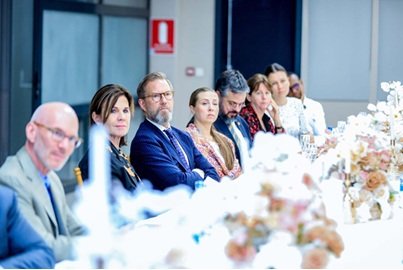By Abdullahi A. Nor
In a tense diplomatic meeting held Thursday 05 June at Mogadishu’s fortified Halane compound, deep divisions emerged among international envoys over the unfolding political crisis in Somalia. The gathering, which included high-level representatives from key international partners, centered around President Hassan Sheikh Mohamud’s much-publicized “National Consultation” initiative—a move critics see as a deliberate stalling tactic cloaked in diplomacy.
While envoys from the United States, the United Kingdom, and the United Nations voiced urgent concern over the President’s escalating authoritarianism and political brinkmanship, European Union Ambassador to Somalia Karin Johansson took a markedly different stance—one that is now raising eyebrows both in diplomatic circles and among Somalia’s civil society.
Despite mounting evidence that President Hassan’s leadership has brought Somalia dangerously close to a 1991-style collapse, Ambassador Johansson argued that it is not the role of international envoys to interfere in what she described as Somalia’s “internal political affairs.” Her remarks were interpreted by many present as a quiet endorsement of the President’s tactics—and by extension, a green light for further destabilization.
“It’s not for us to steer the government,” Johansson reportedly said, doubling down on the EU’s hands-off approach even as others warned of looming catastrophe.
“She Will Be Airlifted to Safety—We Will Not”
For many Somalis, Johansson’s position is seen not as neutrality, but as dangerous indifference. Her approach amounts to willful negligence in the face of a collapsing state. “She’ll be airlifted to safety when the crisis explodes. We’ll be left behind,” said a senior Somali civil servant who spoke on condition of anonymity. “How many more signs does the EU need? This isn’t peacemaking—this is appeasement.”
That criticism is echoed by Somali political analysts who argue that international silence—or worse, tacit endorsement—of Hassan Sheikh’s political maneuvers will only prolong the agony for ordinary Somalis. The President has spent the past three years dismantling federalism, concentrating power in Villa Somalia, and bypassing constitutional norms to extend mandates and silence dissent.
“President Hassan is not trying to fix Somalia. He’s trying to dominate it, even if that means setting the country on fire,” said political analyst Ilyas Noor. “And the EU, by insisting on non-interference, is giving him the space to do exactly that.”
The Cost of Complacency: A New Wave of Refugees?

Beyond Somalia’s borders, the ripple effects of instability are already being felt. European governments are currently grappling with increasing flows of asylum seekers, and experts warn that a full-blown civil war in Somalia would unleash a humanitarian crisis with direct consequences for Europe.
“If the EU thinks Somalia’s collapse won’t affect them, they’re gravely mistaken,” warned one regional security official. “A civil war will mean hundreds of thousands of desperate people risking their lives to cross the Mediterranean. This is not just a Somali problem—it’s a European one too.”
Indeed, Somali migration to Europe surged in the aftermath of state collapse in 1991. A similar breakdown today—under the watch of an indifferent EU presence—could trigger an even greater exodus, fueled by armed conflict, economic ruin, and mass displacement.
The Growing Rift Within the International Community
At Thursday’s meeting, it was clear that Johansson’s EU delegation stood isolated. U.S. and U.K. envoys openly questioned the legitimacy of the President’s consultation process, especially in the context of his unilateral constitutional amendments and marginalization of key Federal Member States (FMS) like Puntland and Jubaland.
The President’s efforts to push forward a centralized model of governance have left the country’s fragile federal system in disarray. Puntland remains effectively disengaged from federal institutions, while Jubaland’s leadership has refused to participate in Villa Somalia’s meetings, citing violations of the Provisional Constitution. At the same time, the mandates of Hirshabelle, South West, and Galmudug administrations remain deeply contested—raising fundamental questions about the legitimacy of any political settlement reached under the President’s oversight.
“This isn’t just a leadership crisis. This is a constitutional crisis. A federal crisis. A legitimacy crisis,” noted one UN official. “You cannot solve this by pretending the President has a mandate he does not.”
Now or Never
Observers say this moment may be Somalia’s last chance to avoid a total collapse. The political temperature is rising. Al-Shabaab remains a persistent threat. State institutions are losing public trust. And the international community is running out of credibility.
The potential ramifications extend beyond Somalia’s borders. A full-scale collapse could destabilize the broader region, affecting neighboring countries such as Kenya, Ethiopia, and Tanzania. Furthermore, the strategic importance of the Indian Ocean and Red Sea trade routes means that continued instability could have global economic implications.
In this context, the EU’s insistence on non-interference is seen by many as a dangerous abdication of responsibility. As one Somali analyst put it, “Neutrality in the face of tyranny is not impartiality; it’s complicity.”
With every day that President Hassan is allowed to govern unchecked, Somalia edges closer to a point of no return. The idea that the international community should merely “observe” as the country teeters on the brink is not neutrality—it is complicity.
For many Somalis, the stakes are existential. “We know what civil war is,” said a Mogadishu resident whose family fled the capital in the 1990s. “The EU ambassador doesn’t. She will fly away in a helicopter. We will bury our dead.”
As the world looks on, the question is no longer whether Somalia is in crisis. It is whether those with the power to make a difference will choose to act—before it’s too late.
Abdullahi Ahmed Nor
Email: abdulahinor231@gmail.com
———-
Related articles:
An Open Letter to President Hassan Sheikh: Preconditions and Agenda for Political Dialogue By Abdullahi A Nor


Leave a Reply